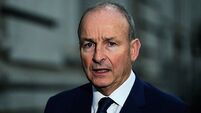Daniel McConnell: Why next year will be even more painful than 2020

The Government is hoping to get a bounce from the reopening of the economy and a fast rollout of the various vaccines. Picture Dan Linehan
Quite rightly, the national conversation over the past 10 days or so has been dominated about the emergence of several vaccines and their potential rollout as well as the welcome emergence out of Level 5 restrictions.
In light of the horrendous year the people of this country and beyond have endured, such news is most welcome.















